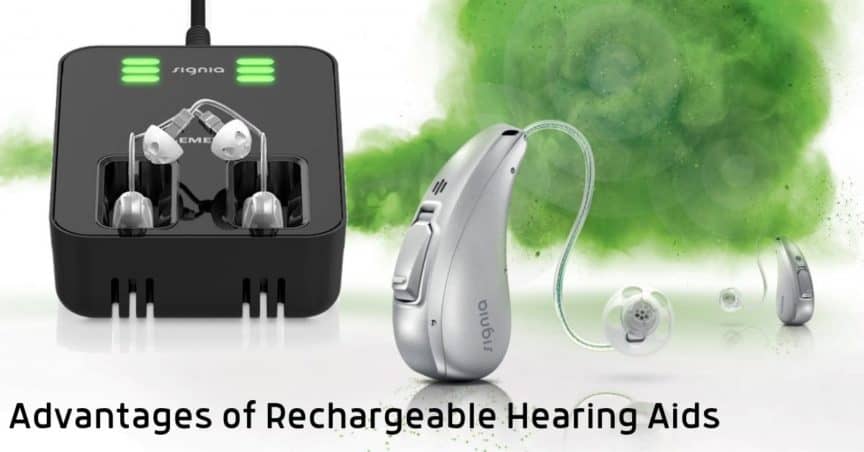Whether it is your laptop, your smartphone or your portable music speaker, many of your personal devices are probably powered by rechargeable batteries. By comparison, hearing aids have been slow on the uptake. But the recent introduction of lithium ion batteries has made rechargeable technology a much more attractive option for your hearing aid. Here are some of the important advantages of using lithium-ion rechargeable batteries.
1. They don’t lose their charge
Hearing aids are still overwhelmingly powered by disposable zinc-air batteries. These batteries need to be activated with oxygen. So once its sticker is removed, even if it is not in use, the battery begins to drain. The average life expectancy of a size 10 zinc-air battery is three to seven days, once the tab is removed. This means that on average, these batteries need to be swapped every 5 days.
In contrast, rechargeable lithium-ion batteries will not lose their charge, just as zinc-air batteries do. Lithium-ion batteries can in fact be expected to provide sufficient power for the wearers of hearing aids for 24 hours of continuous use.
2. No need to compromise on features
Today’s most exciting technology is definitely Bluetooth. The ability to stream music, TV and phone calls wirelessly has revolutionized the hearing aid experience. Unfortunately, Bluetooth is also very taxing on hearing aid batteries. Zinc-air batteries were lasting on average a couple of days, compared to more than a weak in hearing aids without Bluetooth capabilities.
This means that there was sometimes a hard choice for hearing aid wearers to make: use Bluetooth and change your batteries often versus no Bluetooth and having your battery last through the week. With lithium ion rechargeable technology, there is no such trade-off. You can enjoy up to 5 hours streaming and still have the use of your hearing aids for up to 24 hours.
3. Don’t miss out on important events
As mentioned before, rechargeable batteries can run for up to 24 hours. This provides the wearer with confidence and assurance that their battery is ready for use throughout the day, after an overnight charge. Just as you would load your mobile devices over the day, a rechargeable hearing aid can be part of the same simple routine. You will never miss or delay a special moment with rechargeable hearing aids because of the need to change a battery.
4. Perform better in extreme environments
The efficiency of lithium in high stress situations in particular is unparalleled. Contrary to zinc-air batteries, variations in temperature and energy depletion do not affect the delivery of lithium ion, which makes them the ideal choice for hearing aid wearers in colder climates.
5. Speed and convenience
Lithium ion batteries charge faster than previous hearing aid technology, which means that a hearing aid’s downtime is shorter when connected to its charging station. With some models, you only need to charge for three hours to get an entire day’s worth of power! This includes streaming calls, music and other content for five hours. Charge it overnight in the charger and you are ready for the entire day. Another thing to note is that the charger can be taken anywhere, making it easy for travelers to recharge on the go.
6. No need to change batteries
Do you hate changing tiny batteries? Lithium-ion batteries are packaged in sealed cases that are built into the hearing aid. They can not be removed, so you don’t have to fight to put a small battery into the right slot every time you need more power. This makes it more convenient for those with dexterity issues. It also makes it less likely that you will drop and lose small batteries on the floor, making your house safer for small children or pets.
7. Environmentally friendly
Even after years of constant charging, lithium-ion batteries will continue working throughout the lifetime of the hearing aid. You only use one battery for the duration of your hearing aid. The new technology is also environmentally friendly, when you consider that those who use disposable batteries in their hearing aids typically use a hundred batteries annually. We also protect our water sources from the acid and seepage caused by battery wastes by eliminating waste from zinc air batteries in waste disposal sites.
Ear-Tronics
Are you ready to make the switch over to rechargeable hearing aids? We’re on hand to provide the help and support you need to make the right decision. Why not contact us to find out more information?

